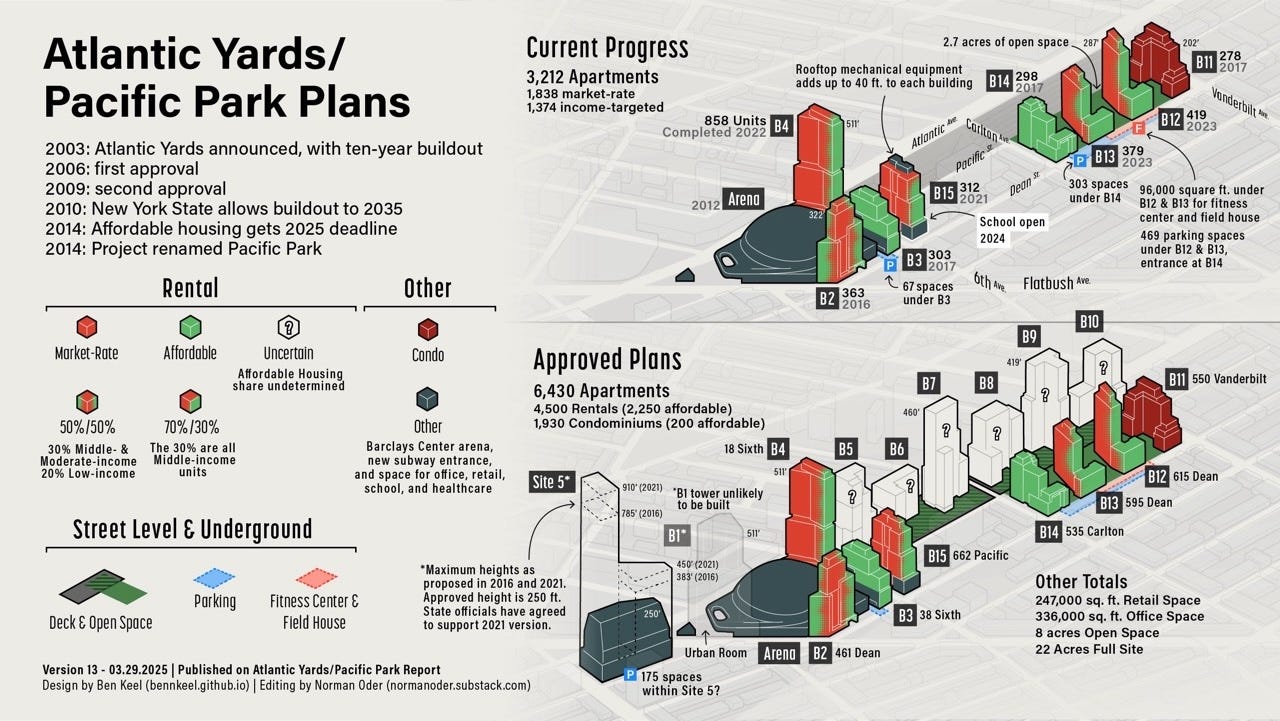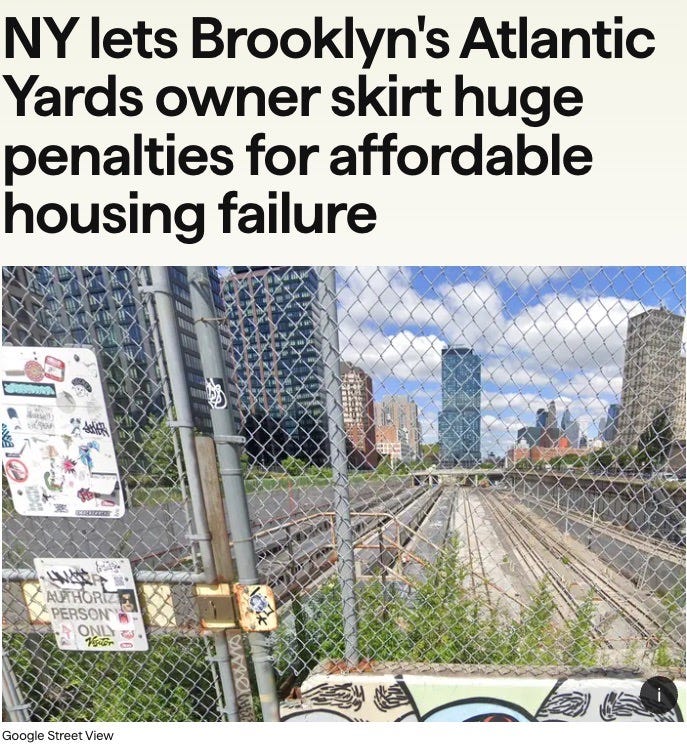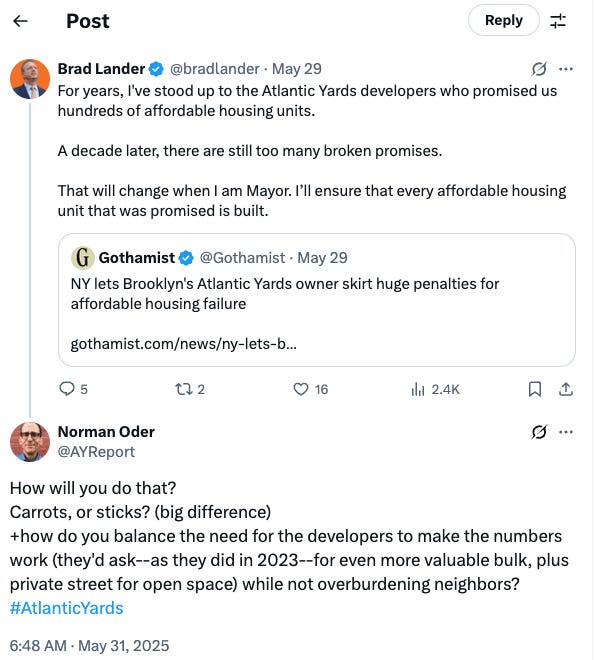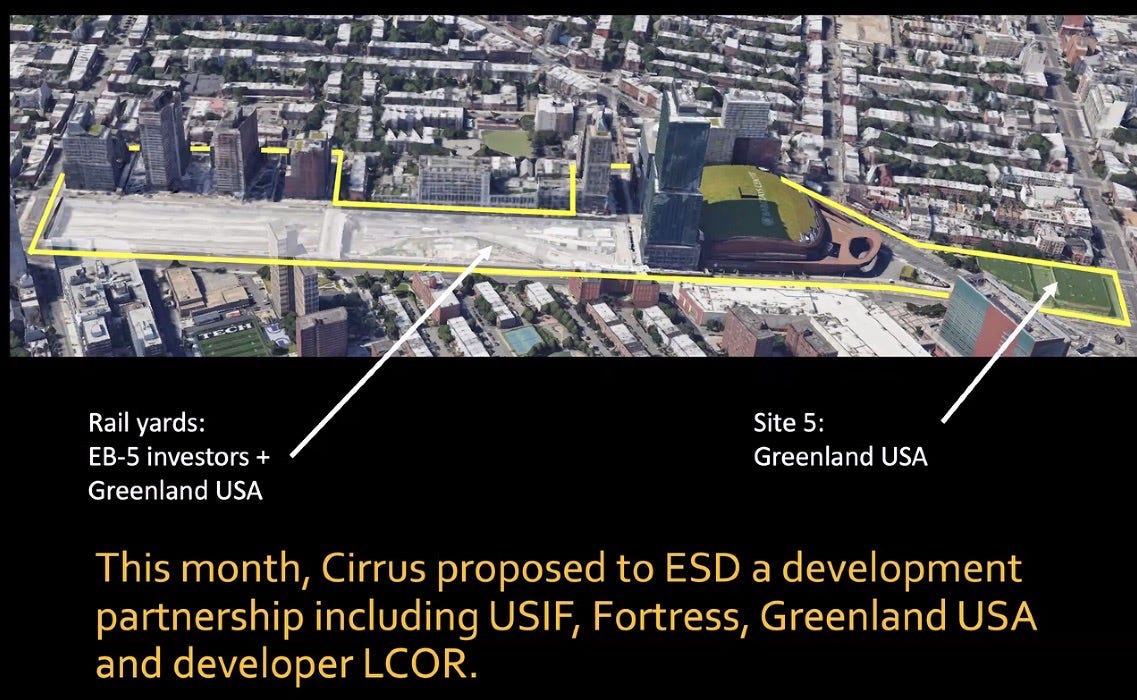Weekly Digest: Affordable Housing Delay, New Developer, and New Questions
Alarm, outrage, & unresolved blight. "Forget it, Jake, it's Atlantic Yards." Meanwhile, BSE Global continues its "ecosystem" expansion.
This digest offers a way to keep up with my Atlantic Yards/Pacific Park Report blog and my other coverage in this newsletter and elsewhere.
To me, at least, it was unsurprising that New York State this week would kick the can down the road rather than enforce the $2,000/month penalties for each of the 876 remaining affordable housing units that were supposed to have been built by the end of May. (That’s $1.752 million a month.)
After all, an official at Empire State Development (ESD), the state authority that oversees/shepherds Atlantic Yards/Pacific Park, suggested in March that they might delay the penalties if they had a proposal, with timelines, for a new developer to replace Greenland USA.
That firm since November 2023 has faced the loss of the six railyard sites (B5-B10) in foreclosure. They require an expensive platform, or deck, over the Vanderbilt Yard, used to store and service Long Island Rail Road trains, before vertical construction can commence.
That said, the news alarmed and outraged many people, if you look at the comments on Gothamist and/on X/Twitter. After all, isn’t a contract a contract?
Well, ESD wants to foster business, not crack down on it. So the state authority has a pattern of retreating from commitments, as Gothamist reported April 16, in With Tesla contract under scrutiny, NY lawmakers call to fine electric carmaker for missing job benchmarks, as reporter Jimmy Vielkind noted.
“Orwellian, almost”
Still, it was shocking that ESD stated, “In an effort to move this process forward, ESD has set up an updated schedule of deliverable target deadlines for the development team while retaining all rights to issue liquidated damages.”
After all, “updated schedule” translates to “kick the can down the road.” It’s “Orwelllian, almost,” to quote one of my Atlantic Yards mantras.
Moreover, the statement suggested that ESD might waive all damages if it gets a new proposal from a pending joint venture led by Cirrus Real Estate and involving—as I first reported this week—a developer named LCOR.
That new proposal presumably would involve extended deadlines, new government concessions to make the project more economically feasible (and profitable), and, reciprocally, some gesture toward new public benefits, such as additional income-targeted “affordable housing.”
The devil is in the details, to quote another mantra. The project’s history suggests that the expected “community engagement” won’t shape the plan but rather provide a scrim of legitimacy. After all, form follows finance, to quote another mantra.
The news breaks
ESD issued a statement the afternoon of May 28, presumably to the few reporters who inquired. That first article was The Real Deal’s For real this time? State sets new deadline to restart Pacific Park.
The next morning, Gothamist framed it as NY lets Brooklyn's Atlantic Yards owner skirt huge penalties for affordable housing failure, crucially adding criticism, with Michelle de la Uz, director of Brooklyn’s Fifth Avenue Committee (and a leader of the coalition BrooklynSpeaks, which in 2014 negotiated the new 2025 affordable housing deadline), calling the state’s move “unacceptable.”
Not long after, on May 29, I published an article that not only echoed such skepticism but advanced the story by naming a new development partner: As Housing Deadline Nears, NY State Punts on Penalties, Reviewing New Development Team. Cirrus JV Now Said to Include LCOR.
The Real Deal then followed up, with LCOR joins proposed Pacific Park development team, state delays fines, adding a more critical edge.,
The only other coverage came from News12: Fines for unfinished Atlantic Yards housing project on pause, "Tens of thousands of families have had to leave and those are predominantly, low-income, families, and people of color who can't afford housing costs in this neighborhood anymore," the report said, quoting Gib Veconi of the Prospect Heights Neighborhood Development Council and a leader of BrooklynSpeaks.1
Beyond derivative (from Gothamist) coverage in the Brooklyn Daily Eagle, the news has been ignored, including by New York City’s three daily newspapers, and the Brooklyn Paper and Courier-Life chain. WNYC did follow-up, interviewing Gothamist/WNYC reporter David Brand.2
What next?
BrooklynSpeaks in 2014 helped secure the new 2025 affordable housing deadline, after threatening a fair-housing lawsuit under the premise that continued delays would disadvantage Black residents, as displacement would make them ineligible for the (then) 50% preference for locals in city-sponsored affordable housing lotteries.
Well, the story isn’t over. On Tuesday, June 3 at 4 pm, BrooklynSpeaks has organized a press conference and rally at Carlton Avenue and Pacific Street—with view of the yet-to-be-decked railyards—“to call on Governor Hochul to bring accountability to the long-delayed Atlantic Yards project.”
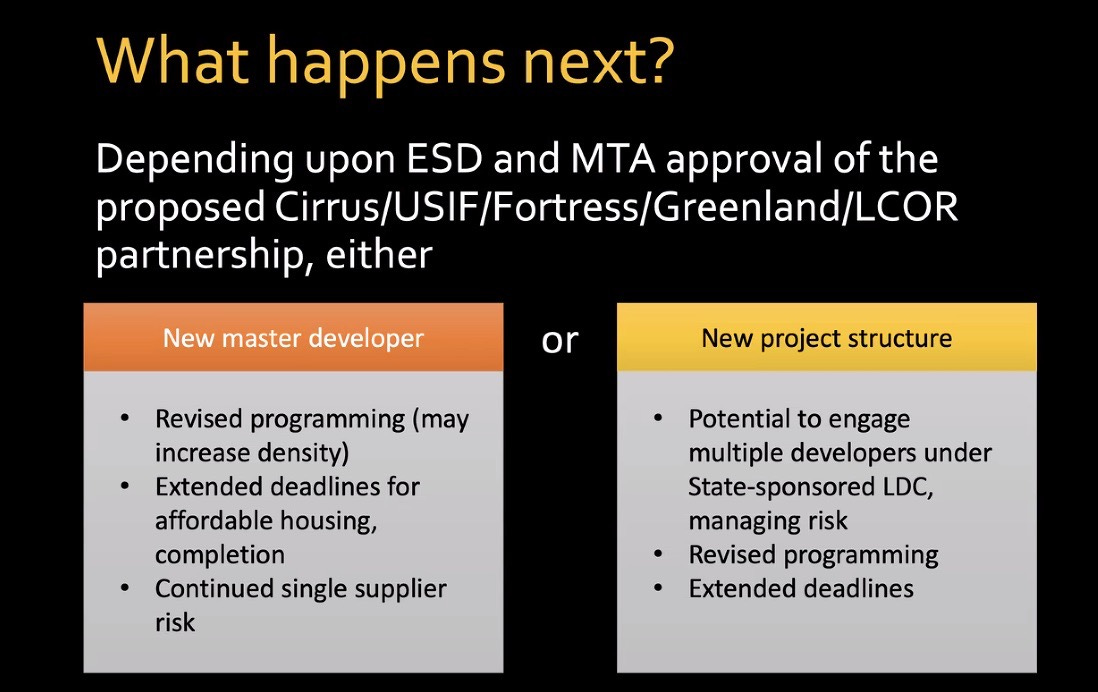
Presumably they will ask for the fines to be enforced; the money could go directly to support new affordable housing in the just-passed Atlantic Avenue Mixed-Use Plan, or AAMUP. (I’ll write more about that separately.)
BrooklynSpeaks favors a new structure—rather than resumption of the fraught single-developer approach—for the project, Veconi said this week. Attending will be state Assemblymembers Bobby Carroll and Jo Anne Simon, city Council Members Crystal Hudson and Shahana Hanif, and various community leaders.
BrooklynSpeaks posture changing?
Note that BrooklynSpeaks today is the main conduit of local public opinion regarding Atlantic Yards/Pacific Park, though—like Develop Don’t Destroy Brooklyn (DDDB) and Brooklyn United for Innovative Local Development (BUILD), two previous Atlantic Yards combatants—they can hardly speak for all of Brooklyn.
BrooklynSpeaks have long advocated for more accountability and deeper affordability. I thought they spun the 2014 settlement—with no promises regarding the level of affordability and a less-than-empowered new advisory body—a little too positively.
Now that their most significant achievement, the new 2025 timeline, has been undermined, let’s see if they go to court, or otherwise aim to block the state’s new plan.
Who are the players?
Gothamist reported, “The latest twist in the decadeslong Atlantic Yards saga has infuriated members of the coalition that demanded affordable housing on the site, and secured the deadline to complete the apartments.”
(Emphasis added)
Actually, the coalition that initially demanded affordable housing was New York ACORN, headed by Bertha Lewis and Ismene Speliotis. BrooklynSpeaks wanted to improve the affordable housing, and the Fifth Avenue Committee’s de la Uz was a critic of the overall plan.
In 2014, BrooklynSpeaks did indeed demand a new timetable for the affordable housing. ACORN’s successor, Mutual Housing Association of New York, has managed outreach and intake, led by Speliotis. They haven’t yet weighed in on the latest news, though surely they want below-market housing faster, and with deeper affordability.
Lander weighs in
Also note this tweet by former Council Member, current city Comptroller, and Mayoral candidate Brad Lander, who quoted Gothamist’s headline and wrote, shifting a tad from his recent embrace of the arena, that he’d stood up to the developer and, as mayor, would “ensure that every affordable housing unit that was promised is built.”
As I responded, would he offer carrots or sticks, since the developers would presumably ask for more concessions.
Beyond that, there’s a tension between balancing the need for the developers to make the numbers work with the impact on the nearest residents. Surely the developers will ask--as Greenland USA did in 2023--for even more valuable bulk, maybe even part of a private street.
After all, Atlantic Yards—to quote another mantra—is a “never-say-never project.” We haven’t even gotten to questions about the definition of affordability, which simply means tenants pay 30% of their income. The project has so far been skewed to middle-income “affordable” units.
So does Williams
City Public Advocate Jumaane Williams observed, “When folks say that CBA (Community Benefit Agreements) or "I promise" should not be trusted... ...The Barclay/Atlantic Yards deal is exhibit A.”
It’s actually worse. As I responded, the Atlantic Yards Community Benefits Agreement, an unenforceable private contract between the project developer and select community groups, has long been ignored. The developer never hired the Independent Compliance Monitor.
This case involves an agreement signed by New York State. If the Governor—who has an interest in encouraging development—won't enforce the fines, BrooklynSpeaks must go to court.
What’s up with Greenland?
What’s intriguing, as I reported, citing Veconi’s presentation, is that Greenland is still part of a development partnership, apparently because it retains development rights at Site 5, catercorner to the arena, as well as B1, the unbuilt tower once slated to be built over the arena.
Greenland has long proposed moving the B1 bulk across Flatbush Avenue to Site 5, creating a giant, two-tower project.
Greenland, as Gothamist noted, doesn’t even have a working phone in its supposed New York office. As I’ve reported, they no longer have a representative on the Pacific Park Conservancy, which manages the project open space, though they presumably have control.
As Veconi noted (and I’ve written), if Greenland remains involved in the new proposal, what's the excuse for deferring the liquidated damages? After all, it has valuable property that it surely seeks to monetize, without the obligation of developing it.
Skepticism, and cynicism
“Collecting liquidated damages is part of their obligation to protect the public interest,” de la Uz told Gothamist. “This is what makes people cynical about government.”
That reminded me of the March 2019 statement by Cy Richardson, then a director of the Atlantic Yards Community Development Corporation, after that advisory body, by a 3-2 vote, failed to support a motion by Veconi to get details on how the remaining affordable units would be delivered. (ESD had opposed the motion.)
"I've grown into a cynical individual, particularly as it relates to public-private partnerships,” Richardson said at the time. “I would like every opportunity to remind the broader community, defined as you would like, of this master commitment... Because I don't want it to be too late when these things have to be renegotiated."
The passing this week of legendary New York journalist Tom Robbins, late of the Village Voice, City Limits, and more, led to tributes, some citing his advice: it’s a journalist’s job to be skeptical, but never cynical.
I agree, though sometimes it’s hard to avoid cynicism.
“Forget it, Jake”
A commenter on my article, Unset, observed, trenchantly:
In sum, the "blight" of the railyards that supposedly needed to be remedied--the pretext for the whole fandango!--is still there. And not going anywhere anytime soon. Almost two decades after perfectly nice private homes and businesses were seized by the state and turned over to private developers.
Forget it, Jake. It's Chinatown.
Indeed, blight in a gentrifying neighborhood was always a stretch.
That comment reminded me of something I wrote nearly 14 years ago, "Forget it Jake, it's Atlantic Yards,” echoing that classic line from the ending of Roman Polanski's 1974 movie Chinatown, concerning water rights, real estate, and nefarious doings around Los Angeles.
In other words, there’s nothing to be done about it. I also mentioned advocate Michael D.D. White’s invocation of the film when earlier writing about Mayor Mike Bloomberg’s successful effort to overturn term limits:
Life can be surprisingly like the movies. A nagging, noirish sense of disquiet telling you that things are not right can cause you to keep circling back to revisit clues for what they really mean.
That "nagging, noirish sense of disquiet" persists.
From this newsletter
May 28: Flashback, 2014: What NY Times Scoop on the New Atlantic Yards Plan Missed.
Downplaying Greenland, omitting $2,000/mo. fines for 2025 deadline, and misleading re affordable housing and accountability. Today, the absent skepticism seems glaring.
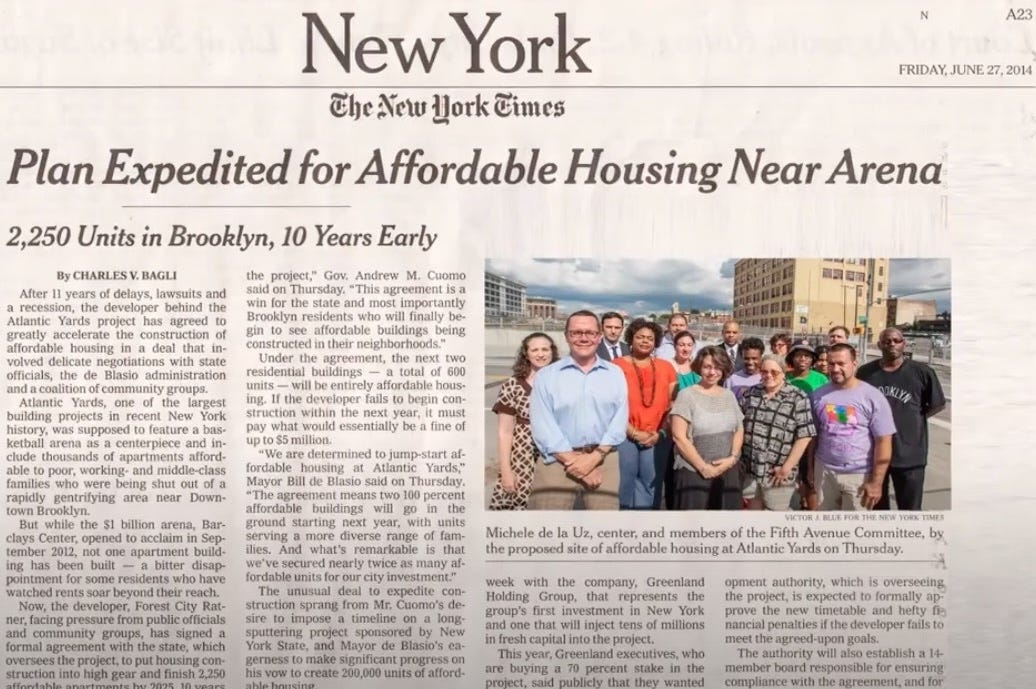
Why write so much about that one article? Because there’s a real risk that the next iteration of the project will come with insufficient skepticism.
May 29: As Housing Deadline Nears, NY State Punts on Penalties, Reviewing New Development Team. Cirrus JV Now Said to Include LCOR.
BrooklynSpeaks, which in 2014 negotiated 2025 milestone, says public must be compensated for affordable housing not delivered.
From Atlantic Yards/Pacific Park Report
May 26: What happens June 1, when affordable housing penalties are due? We don't know (yet). The documents leave wiggle room, notably a "right to refrain."
That may be what has happened.
May 27: Flashback 2007 & 2014: "As things change in the future, who decides how the gains & losses are shared between developer profit & housing affordability?"
This resonant quote came from David A. Smith, an affordable housing analyst. In other words, what structures do we have to ensure trust?
May 30: Real estate executive MaryAnne Gilmartin, ex-Forest City CEO, bundles nearly $64K for Cuomo's mayoral race, including from ESD Chair.
Got that? The chair of Empire State Development, the state authority that oversees/shepherds Atlantic Yards, supports Cuomo, who surely supports the Cirrus plan for the project.
May 31: Barclays Center releases June 2025 events calendar: eight ticketed events, including three concerts and four New York Liberty games, plus the NBA Draft. Also: private events, notably graduations.
May 31: BSE Global plans two-day "Planet Brooklyn" music festival in August, at/outside the Brooklyn Paramount, Brooklyn Academy of Music, and Barclays Center, as well as the surrounding streets.
It’s another sign of the emerging Brooklyn "ecosystem” of events, experiences, retail, and hospitality fueled by new investment into the parent company of the Brooklyn Nets, New York Liberty, and Barclays Center operating company.
That news report stated, inaccurately, “As part of the lawsuit, the developers, Greenland USA, would be fined $2,000 a month if the affordable housing wasn't completed by the deadline.” That’s $2,000 per month for each missing unit, so multiple that by 876, and the result is $1.752 million.
I posted a comment with a couple of corrections/clarifications:
--the 2014 agreement was not to build 876 units of affordable housing, it was to complete the required 2,250 units, of which 181 were under construction; since then, a total of 1,374 have been built, with 876 left to go
--Daniel Goldstein was not a "holdout"; he'd already lost his apartment to eminent domain and thus a tenant of the state; the $3 million payment, from the state (via the developer), was to time his departure at Forest City's desire, to ensure that the sale of the Brooklyn Nets to Russian oligarch Mikhail Prokhorov proceeded.
It's worth noting that taxpayers ultimately reimbursed Forest City Ratner for $100M in its purportedly generous purchases of property before the state used eminent domain.




